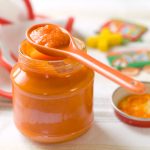Concerned with exposure to heavy metals? You should be, they are even in baby foods
 (NaturalHealth365) New parents do everything they can to control their newborn’s environment, from locking up dangerous chemicals to putting plastic covers on electric outlets. But what about the pollutants and contaminants found in unexpected places? Exposure to potentially toxic substances is part of modern life, but the presence of lead, arsenic, mercury, and other heavy metals in popular baby food is a shocking revelation. This bombshell doesn’t only affect parents and children but anyone who trusts big food companies, nostalgic brands (Gerber, Beech-Nut), and corporate U.S. food culture.
(NaturalHealth365) New parents do everything they can to control their newborn’s environment, from locking up dangerous chemicals to putting plastic covers on electric outlets. But what about the pollutants and contaminants found in unexpected places? Exposure to potentially toxic substances is part of modern life, but the presence of lead, arsenic, mercury, and other heavy metals in popular baby food is a shocking revelation. This bombshell doesn’t only affect parents and children but anyone who trusts big food companies, nostalgic brands (Gerber, Beech-Nut), and corporate U.S. food culture.
According to a recent government report, commercial baby foods made by the country’s largest baby food manufacturers are tainted with significant levels of toxic heavy metals, including arsenic, lead, cadmium, and mercury. Toxic heavy metals endanger infant neurological development and long-term brain function. While children are uniquely vulnerable to heavy metals, according to a 2018 study at Cambridge University, among adults, constant exposure to heavy metals can increase heart disease by 80 percent.
Scary truth: 95 percent of baby food tested contained heavy metals
Arsenic, lead, cadmium and mercury are in the World Health Organization’s top 10 chemicals for concern for infants and children, so it’s shocking that baby food manufacturers knowingly sold products with high levels of those toxic metals.
What’s even more shocking, however, is that baby food companies set their own safety standards for toxic metals as the U.S. Food and Drug Administration (FDA) looks on in silence, complicit in the toxic poisoning of our children. (While the FDA set a standard of 100 parts per billion inorganic arsenic for infant rice cereal, it has not yet set minimum levels for heavy metals in most infant food.)
Here’s the thing about heavy metals: they are part of the earth’s crust, naturally found in the environment, and therefore unavoidable. Nevertheless, most of the heavy metals in food come from soil or water that has been contaminated through industrial farming or manufacturing practices such as pesticide application. Metal-containing pesticides were the dominant type of pesticide for many years, the assumption that they were safe slowly eroding as study after study linked heavy metals to cancer, neurological disorders, low IQ, and permanent brain damage.
WARNING: Convenience poisons our children … one Gerber Baby at a time
Some baby food manufacturers, including Sprout Organic Food, Campbell Plum Organics, and Parent’s Choice, refused to share data with the government’s Oversight and Reform Committee, which begs the question: what’s really lurking in their products?
Discover a Simple and Effective Way to Remove Toxins: This is Jonathan's #1 choice for at-home detoxification. Special offer ends Feb. 16.
Commercial baby food is convenient and easily accessible. Grocery store shelves are stocked with countless vegetable purées and rice cereals, but isn’t a child’s health more important than convenience? Shouldn’t we be demanding more for our children (and ourselves) than cheap, processed, corporate food?
At the very least, the FDA needs to establish regulations and standards for heavy metals in baby foods, manufacturers need to rigorously test their products for toxicity, and all contaminated baby foods should contain warning labels.
As a parent or caregiver, you need to be vigilant. Choose safer options and avoid high-risk baby foods. Consider making your own age-appropriate baby food using organic, sustainably sourced ingredients. It’s certainly worth the effort to protect the health of our families.
Sources for this article include:



